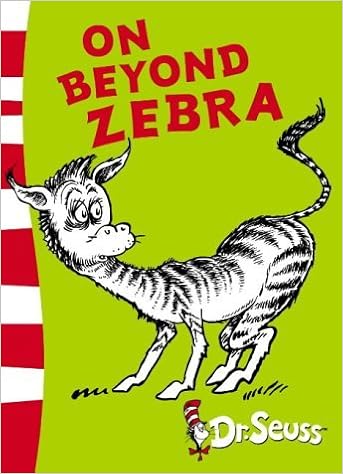“On Beyond Zebra” by Theodor Seuss Geisel (“Dr. Seuss”)

The children’s books of Theodor Seuss Geisel (better known as “Dr. Seuss”) are divided between the didactic and the anarchic.
Didactic books, often with a solidly liberal agenda, predominate. These include The Lorax (a warning against environmental destruction), The Sneetches(a satire of mindless consumerism and status-seeking), and The Butter Battle Book (a Cold War cautionary tale).
Some of Dr. Seuss’ most famous books combine the didactic and the anarchic. The Cat in the Hat is one of the great agents of anarchy in children’s literature, his inspired chaos opposed by Sally and her brother, and finally contained only by the re-appearance of their mother.
Dr. Seuss’ teaching books show the same dynamic. For example, Dr. Seuss’s ABCmakes learning the alphabet fun through a wild collection of assonance- and alliteration-heavy nonsense rhymes (and one highly inappropriate image for children).
What I like about Geisel’s On Beyond Zebra (1955) is that it is the mirror-opposite of the ABC book and many others. On Beyond Zebra opens with this quote:
Didactic books, often with a solidly liberal agenda, predominate. These include The Lorax (a warning against environmental destruction), The Sneetches(a satire of mindless consumerism and status-seeking), and The Butter Battle Book (a Cold War cautionary tale).
Some of Dr. Seuss’ most famous books combine the didactic and the anarchic. The Cat in the Hat is one of the great agents of anarchy in children’s literature, his inspired chaos opposed by Sally and her brother, and finally contained only by the re-appearance of their mother.
Dr. Seuss’ teaching books show the same dynamic. For example, Dr. Seuss’s ABCmakes learning the alphabet fun through a wild collection of assonance- and alliteration-heavy nonsense rhymes (and one highly inappropriate image for children).
What I like about Geisel’s On Beyond Zebra (1955) is that it is the mirror-opposite of the ABC book and many others. On Beyond Zebra opens with this quote:

No comments:
Post a Comment